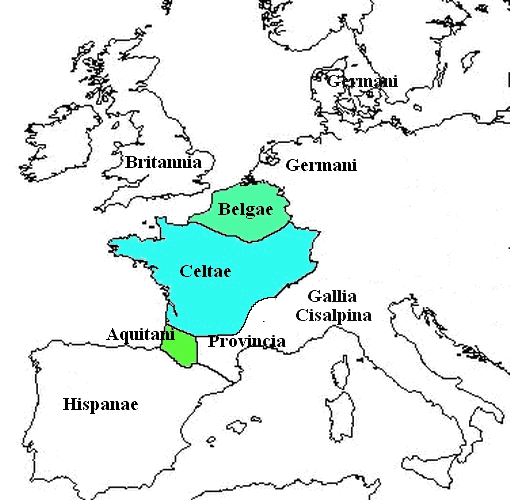The geography of Western Europe at the time of J Caesar (second half of the first century BCE) was conceived by the Romans in terms of major regions with, to us, ill defined boundaries.
These divisions were based on travellers accounts, some written but most oral, that have not come down to us, trade and the campaigns against the Cimbri, the Carthaginians, the Averni, the Allobroges and the Ligurian tribes. Of course much more was known than we learn from classical authors - the ease with which the Roman army conducted operations in France, Spain, Britain and Germany demonstrates this. The regions described or implied by Caesar and his contemporaries were:
Gallia transalpina centred on Arles, covering the littoral of the Golfe de Lyons and bounded to the west by the upper Garonne and in the north by the Sa˘ne. Transalpine Gaul had been organised as a province after the conquests of Ahenobarbus in the second century BCE. Beyond were the "three Gauls" known to the Romans and described by Caesar.
Aquitania stretching northwards from around the present frontier with Spain and covering the valley of the upper Garonne but not the Bordeaux region.
Celtae covering the remainder of France to the Seine-Marne line, the Pfalz, a part of modern Switzerland and Germany on the left and right banks of the Rhine south of the Hunsrück - Taunus line.

Belgae from the Seine-Marne to the Rhine at Koblenz, including northern France, the south western Netherlands, Luxembourg, Belgium and part of Germany west of the Rhine
Britannia, the main British island, covering today England, Wales and Scotland. Caesar demonstrates considerable ignorance of conditions in Britain. His account is taken from an earlier source and is not up to date. It is clear that the Gauls and in particular the Belgic and the Aremorican tribes knew a great deal about Britain. The Belgae had close ties to the British and used British military assistance if the gold coins of the Belgae found in Britain are interpreted correctly. The Veneti controlled the carrying trade to Britain and must have been very familiar with the sea route.
Hibernia Ireland was vaguely known to the Romans from earlier Greek accounts.